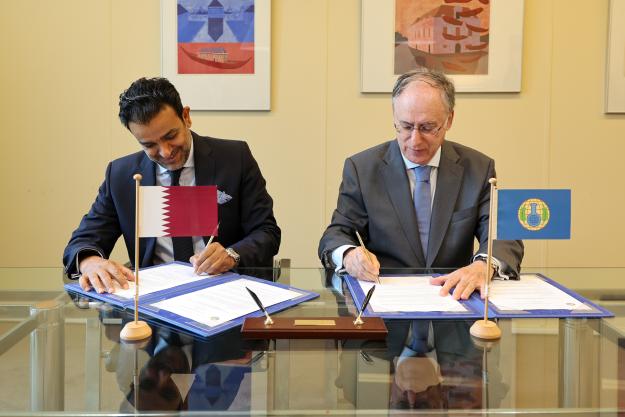
H.E. Dr. Mutlaq bin Majed Al Qahtani, Permanent Representative of the State of Qatar to the OPCW, and Ambassador Fernando Arias, OPCW Director-General
THE HAGUE, Netherlands—24 June 2024—The Organisation for the Prohibition of Chemical Weapons (OPCW) welcomes Qatar’s voluntary contributions of €20,000 to support the OPCW’s upcoming Global Conference on the Role of Artificial Intelligence (AI) in advancing the implementation of the Chemical Weapons Convention (CWC). The conference aims to holistically examine the implications of AI technology within the framework of the CWC.
The contribution was formalised on 20 June 2024 in a signing ceremony held between the Ambassador, Permanent Representative of the State of Qatar to the OPCW, H.E. Dr. Mutlaq bin Majed Al Qahtani, and the OPCW Director-General, Ambassador Fernando Arias, at the OPCW’s Headquarters in The Hague.
The conference, to be hosted by Morocco and co-organised by the Technical Secretariat of the OPCW from 22 to 24 October 2024 in Rabat, will bring together leading global experts from the fields of science, industry, and government, and facilitate a comprehensive understanding and appreciation of the role of AI in CWC implementation.
The conference will explore three focus areas:
-
The role and impact of AI in Chemistry from the lens of evolving science and policy discourse;
-
impact and challenges of AI on the chemical industry at-large; and
-
challenges presented by AI in counterterrorism and implementation of CWC.
Ambassador Al Qahtani stated: “As part of the State of Qatar’s ongoing commitment to supporting the OPCW’s diverse activities, we are delighted to offer a voluntary contribution on its behalf to support the Artificial Intelligence Project. This investment aligns with our vision of the transformative power of AI and our dedication to developing innovative technologies that can help achieve the Organisation’s noble objectives.”
The OPCW Director-General, Ambassador Fernando Arias, stated: “AI is reshaping the chemical sciences, which poses both opportunities and risks. The OPCW is deeply grateful for Qatar’s contribution towards this innovative conference. It underscores Qatar’s commitment to international peace and security and highlights the importance of global cooperation in addressing the challenges and opportunities presented by AI technologies.”
The Director-General encouraged all OPCW Member States to consider supporting the Organisation’s priority activities, including this conference, through voluntary and in-kind contributions.
Background
Qatar has been an active member of the OPCW since 1997 and is a member of the OPCW Executive Council, the governing body of the Organisation. Since 2022, Qatar has made voluntary contributions totalling more than EUR 440,000 to various OPCW trust funds, including the EUR 100,000 to the Trust Fund for the Centre for Chemistry and Technology. The Qatari National Committee for the Prohibition of Weapons hosts an Annual Meeting of Representatives of the Chemical Industry and National Authorities of States Parties to the Chemical Weapons Convention.
As the implementing body for the Chemical Weapons Convention, the OPCW, with its 193 Member States, oversees the global endeavour to permanently eliminate chemical weapons. Since the Convention’s entry into force in 1997, it is the most successful disarmament treaty eliminating an entire class of weapons of mass destruction.
In 2023, the OPCW verified that all chemical weapons stockpiles declared by the 193 States Parties to the Chemical Weapons Convention since 1997 — totalling 72,304 metric tonnes of chemical agents — have been irreversibly destroyed under the OPCW’s strict verification regime.
For its extensive efforts in eliminating chemical weapons, the OPCW received the 2013 Nobel Peace Prize.
